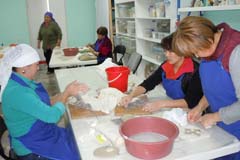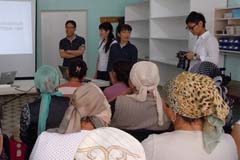Research Fellow Shimoda Announces Achievements and Challenges of Inclusive Business in Kyrgyzstan
2016.06.16
The International Union of Anthropological and Ethnological Sciences (IUAES)' Inter-Congress 2016 was held from May 4 to 9 in Dubrovnik, Croatia. Research Fellow Yukimi Shimoda of the JICA Research Institute participated in the group discussion "What is 'sustainable' in rural development?" (IUAES Commission on Anthropology and the Environment), and she presented an interim report on her analysis of her research project "A Study on Socio-cultural Influences of Inclusive Business."
The objective of "A Study on Socio-cultural Influences of Inclusive Business" is to consider the socio-cultural effects on low-income people, transnational corporations and their employees of inclusive business in Kyrgyzstan and Laos, which are aiming to solve development issues by involving low-income people in value chains in businesses.
In her presentation "Can business contribute to the sustainability of rural development?", Shimoda first roughly explained the background, objectives and methods of her research, along with the roles of men and women in rural Kyrgyzstan. Then, she talked about the JICA project "Community Empowerment Project through Small Business Promotion by One Village One Product (OVOP) Approach in Issyk-Kul region" in Kyrgyzstan. In her presentation based on result of her analysis of a field study in November-December 2015, she cited the examples of female felt producers of different age groups - including those in their 30s, 40s and 50s - and reported that the producers enhanced their self-respect through the project, which gave rise to a positive cycle in which the businesses kept going. On the other hand, she also suggested that the project depends on a delicate balance between work and private life, explaining that the work causes stress to the producers and their families, and that the support of their families (husbands) is under the precondition of it being "short-term work."

Felt production in Kirghiz
After the presentation, participants asked Shimoda several questions. One was about the definition of "sustainability." Shimoda answered that in this presentation it referred to "sustainability as a business." The definition of "sustainability" was one of the main subjects of a debate in the overall discussion that resulted in confirming the necessity of further discussion.
Also, the World Council of Anthropological Association Biennial Meeting was underway during Inter-Congress 2016. Participants in the biennial meeting included representatives of anthropology associations in various countries. At this event, it was reported that those who majored in anthropology tended to choose careers doing practical work as development consultants or working for private businesses.

Producers participate in a seminar
Describing her observations from this Inter-Congress 2016, Shimoda said that there were few participants from development assistance agencies, but there were panels closely connected to issues facing development assistance such as health, education, the environment, disasters, immigration, refugees, development, investment, disabilities and development theory and practice. She felt a need for proactive participation in such conferences as an opportunity to deepen dialogue, interaction and mutual understanding between development assistance practitioners on the one hand and anthropologists who research developing countries on the other.

事業事前評価表(地球規模課題対応国際科学技術協力(SATREPS)).国際協力機構 地球環境部 . 防災第一チーム. 1.案件名.国 名: フィリピン共和国.

事業事前評価表(地球規模課題対応国際科学技術協力(SATREPS)).国際協力機構 地球環境部 . 防災第一チーム. 1.案件名.国 名: フィリピン共和国.

事業事前評価表(地球規模課題対応国際科学技術協力(SATREPS)).国際協力機構 地球環境部 . 防災第一チーム. 1.案件名.国 名: フィリピン共和国.

事業事前評価表(地球規模課題対応国際科学技術協力(SATREPS)).国際協力機構 地球環境部 . 防災第一チーム. 1.案件名.国 名: フィリピン共和国.

事業事前評価表(地球規模課題対応国際科学技術協力(SATREPS)).国際協力機構 地球環境部 . 防災第一チーム. 1.案件名.国 名: フィリピン共和国.
scroll